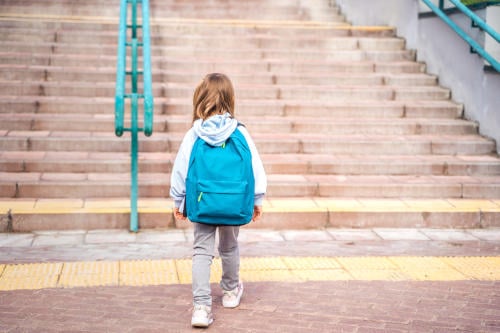Trauma is defined as “stressful, frightening or distressing events that are difficult to cope with or out of our control. It could be one incident, or an ongoing event that happens over a long period of time.”
https://www.mind.org.uk/information-support/types-of-mental-health-problems/trauma/about-trauma/?form=MG0AV3
“New research suggests that as many as 13 out of 30 students in an average classroom will have toxic stress from three or more traumatic experiences.”
https://notfineinschool.co.uk/trauma
There is minimal data about the number of children with school trauma. However, as statistics of mental health disorders in our younger population have risen, it could be reasonable to assume that school trauma will account for some of this increase.
It is crucial for a child experiencing school trauma to receive help from a trusted adult, but how can we know when a child may be feeling this way? Trauma could have many origins and children can sometimes mask their feelings.
How to Spot the Signs of Trauma

School-related behaviour. A child could become increasingly late or absent from school. Children with trauma often don’t prioritise schoolwork, or turn up with books forgotten, or disordered, incomplete homework (if done at all). Withdrawal from school friendship groups may also occur.
Emotional Changes. Children with school trauma may display impulsive outbursts or frequent signs of sadness. They may appear very introverted or unusually exhausted. Anxiety levels might be overt, as are notable signs of fear, coupled with an overall loss of spark.
Physically. A young person experiencing school trauma may appear unkempt and/or may not be eating normally. There could be accompanying signs of tiredness and a general look of unwellness. The anxiety can also cause body aches, in particular head and stomach aches.
What Causes Trauma in School?

Specialist SEND tutor Chelsea, has worked in a large secondary comprehensive school in South-East London. “Unfortunately, I’ve witnessed a lot of trauma, which can occur in school for many reasons. Year 7 children are now in a less nurturing system, coping with larger numbers of pupils. Sometimes they feel lost, flitting from room to room with several different teachers.”
“It also became apparent that children in year 8 could experience school trauma due to no longer being the new students and now being ‘thrown into’ the school mass, so especially monitoring children at the start of year 8 is helpful.”
“Some children are simply overwhelmed by school culture; the workload, expectations, subjects and the homework. Assessments are increasingly factored into the school week, which can be quite impossible for some pupils. In my opinion, this progressive increase has led to a marked surge in school trauma.”
Problems can occur in social settings outside of school, especially via social media outlets. Chelsea continues, “An issue may happen on social media that then spills into a young person’s school life, especially if the other person/s involved attend the same school.”
How to Help a Child with School Trauma?

A child with school trauma may be apprehensive of adults and/or people in general. If you are worried as a parent, approach your child’s Head of Year at school or their form teacher. A chat with the school SENCO would be helpful for children with additional SEND (Special Educational Needs and Difficulties). Share all the information you have about your child’s situation. If other pupils are involved, try to record/collect evidence if possible.
Chelsea adds, “A Head of Year may appoint a mentoring buddy from Year 11 or 12 to talk to your child or just be there for them at school. Students would be carefully chosen to fulfil this role.”
“From my experience in school, it is most impactful if teachers share information with other staff about a child with school trauma, to foster a collaborative approach. A team effort of keeping a watchful eye whilst presenting a trauma-informed, friendly, non-judgmental stance is best.”
“Children that are suffering due to school culture can be greatly supported by a task management board. At the start of a lesson (or beforehand if possible), a teacher would note three main expectations of the lesson, with references to worksheets and reading material. Knowing this can give a student more autonomy and allow them to find the classroom less of a threat.”
Speaking to your GP to outline your concerns may lead to support for your child via a therapy, such as trauma-focused CBT or a one-to-one specialist. They may also put you in touch with organisations that deal with trauma.
Young people enduring trauma will need a peaceful space at home to relax. Conversations could be gently encouraged but not expected. Initially, just letting a child know you are there to support them can be enough. Sometimes, children are not ready to discuss their feelings.
Encourage your child to walk or take up a sport. Physical activity can promote healing via a shift in mood. Avoid anticipating how a child should respond; it is not possible to gauge a timescale for healing. Children will deal with their trauma in their own time and each child will respond differently. Stay tuned to your child’s specific needs and their own healing pace.
Finally, remember that this experience can be overwhelming for you as a parent, so allow some time to ensure your wellness is also prioritised; the links below will take you to some excellent support options for both young people with trauma and their parents/carers.
Useful Websites:
https://notfineinschool.co.uk/young-people
https://www.youngminds.org.uk/about-us/our-strategy/
https://www.place2be.org.uk/
Please note: The information provided within this blog, by SENsational Tutors, is for general information purposes only. We appreciate that every person is unique and any advice/experiences mentioned within the content of each blog may not be reflective of your own personal experience. All information on the site is provided in good faith and is for educational informational purposes only. It is not a substitute for professional advice. Before taking any actions based upon such information, we encourage you to consult with appropriate professionals.




